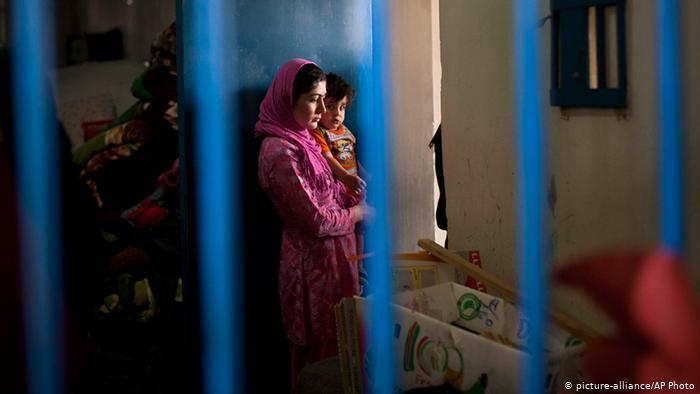As the coronavirus pandemic broke out in Afghanistan, President Ashraf Ghani issued two decrees to release Afghan prisoners who were imprisoned on charges other than murder, corruption, drug smuggling and violence against women. As per the decrees, the prisoners charged with minor wrongdoings would be released on bail and under some other conditions.
Out of an estimated 36,000 prisoners in the country, 9,683 of them have been released, says Farhad Bayani, spokesperson for the prisons administration. Mr. Bayani says, under the first presidential decree, issued in March this year, 6,345 inmates including 172 women were released. Under the second decree, issued in April this year, 3,338 prisoners including 121 women were released, according to the spokesperson.
But the decrees did little to change the fates of many female prisoners in the country. According to prisoner authorities, most female prisoners failed to complete the due process.
The 21-year-old Maryam along with the 22-year-old Farishta, on charges of money stealing , each were sentenced to five years imprisonment. The inmates have served three years in prions and still live under detention. Maryam who passed three years of imprisonment says that she was told by the officials to pay 200,000 afghanis fine for the remaining two years to get released. Since, Maryam failed to pay the expected amount she is still under captivity. Farishta who had to pay 300,000 afghanis for three remaining years of her sentence could not afford it either.(Maryam and Farishta are nom de guerre used in this story to protect their identities).
Maryam says there are 19 prisoners in the ward where she serves her sentence. “Health care is almost zero, I am afraid, I may die if I get infected by virus,” she told Kabul Now.
Maryam underlines that 12 detainees share a single room in a ward and among them there are some political prisoners such as Islamic State (IS) female members. She complains that no precautionary measures—wearing masks, gloves and washing hands or soap—have been taken to prevent the risk of coronavirus outbreak in Pol-e-Charkhi detention center.
The 22-year-old Farishta, who serves her sentence in the same room as Maryam does, says only those who can afford can get hand sanitizers from outside of the prison.
Mr. Bayani, however, says, under the presidential decrees, those female prisoners who can complete the due process—which includes providing a copy of national ID card or an official letter issued by the Afghan ministry of women affairs and a cash fine—will be released.
Roya Dadras, spokesperson for the Ministry of Women Affairs (MoWA), confirmed to Kabul Now that 104 women detainees have been released hitherto and efforts are underway to bring families and relatives of the female inmates on board with new government initiative.
With a deep-rooted patriarchic culture, Afghanistan is an unsafe country for women who fall in a trap to end up in prison. Many zealous Afghan families treat women as symbol of tribe and kinship dignity. Afghan families often tempt to deny their female members who are criminalized for whatsoever charges and as a result many female prisoners are sent to safe houses—NGO-run shelters founded for protection of women who don’t have guardians—when they are released from detention centers. The repercussion of such a treatment makes reintegration a tough and in most cases a never achievable task for those women who experience being jailed on any charges.
Ms. Dadras says that the MoWA was taken unprepared when the government released group of females from detention centers as most of them had no place to live. “We are told to take them to safe houses but there is no space in shelters,” she underlines.
Over last couple of weeks, 40 women were released from Herat detention center and taken to safe houses. But as there was not space in shelters some of them were sent back to prison, according to the MoWA.
Though the Afghan authorities claim that precautionary measures have been taken to prevent outbreak of the virus in Afghanistan’s Pol-e-Charkhi detention facility, Maliha Hassan, a former commissioner of the Afghan election commission, who served eight months on charges of vote-rigging in 2018 parliamentary elections, says healthcare conditions in the prison were terribly worrisome.
Firsthand accounts by Maryam and Farishta show that female prisoners are serving sentences in a terribly awful condition and they have “no rights to raise their voices” against what they call verbal and physical abuse in the hands of prison authorities.
Up to May 10, 16 people including prisoners and prison workers tested positive for Covid-19, with six positives cases recorded in Nangarhar prison, one case in Takhar detention center, and the remaining nine cases recorded in Afghanistan’s Pol-e-Charkhi detention facility, according to Mr. Bayani.
The risk of a rapid outbreak of coronavirus among detainees in Afghanistan’s detention centers remains high as healthcare conditions are poor and prison wards are packed with inmates who can neither follow restrictions such as social distance nor can afford to buy hand sanitizers and face masks.




